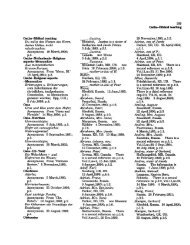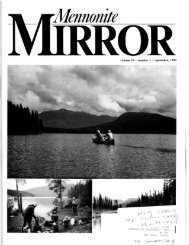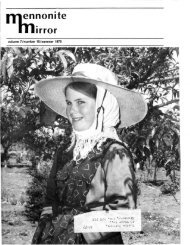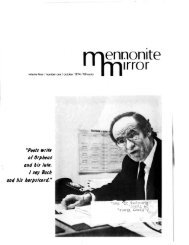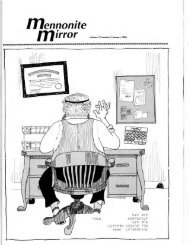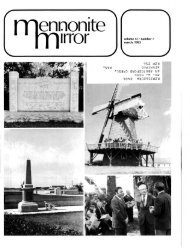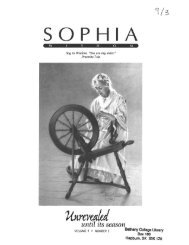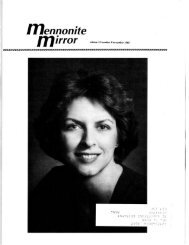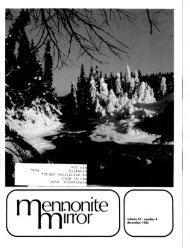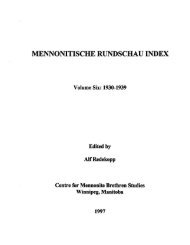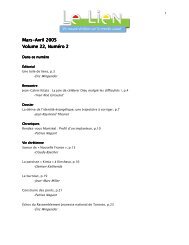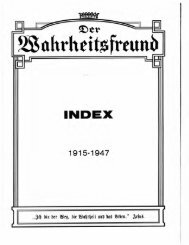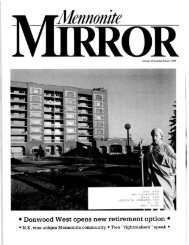mennonite mirror - Canadian Conference of Mennonite Brethren ...
mennonite mirror - Canadian Conference of Mennonite Brethren ...
mennonite mirror - Canadian Conference of Mennonite Brethren ...
You also want an ePaper? Increase the reach of your titles
YUMPU automatically turns print PDFs into web optimized ePapers that Google loves.
Taunt inspired hard work<br />
by Hilda Matsuo<br />
Someone with a nose for journalism suggested<br />
that the old man had a story to<br />
tell. Unlike many success stories the tale<br />
is set during the bleakest years <strong>of</strong> <strong>Canadian</strong><br />
agriculture; the thirties, the depression<br />
and Winkler figure in the tale. Open<br />
scepticism for. the educated with their<br />
"hare-brained schemes" in those days<br />
was expressed with a summary "de<br />
jeleehda, de vekeehda" or " more learned,<br />
more misguided."<br />
If a cynic's tongue can act as a goad,<br />
Mr. A. A. Kroeker had one. At leasfhe admits<br />
to having felt chagrin. In the dialect,<br />
"daut rubbefd am een besche." A<br />
neighbor's barbed statement definitely<br />
"rubbed him the wrong way". He had<br />
remarked that greed would help in the<br />
planting <strong>of</strong> the Kroeker's corn, but not in<br />
the weeding <strong>of</strong> it. On his daily trip to the<br />
field Kroeker passed the neighbor's yard<br />
and, remembering, he worked hard~r.<br />
Seeing Mr. Kroeker <strong>of</strong> Kroeker Seeds in<br />
the comfort <strong>of</strong> a modern high-rise today,<br />
one has the conscious fe~ling that a factor<br />
in his survival as a valuable human<br />
being to an age <strong>of</strong> four score and four<br />
has been his ability to strike up a happy<br />
working relationship with the gains <strong>of</strong><br />
the marketplace. The comforts <strong>of</strong> the<br />
surroundings are pleasing but not ostentatious.<br />
His "beauties" are his wife<br />
whose fairest adornment is her gentle<br />
face, and a tall amarylis which appears<br />
by right <strong>of</strong> having sprung from the soil to<br />
dominate the whole living room.<br />
By way <strong>of</strong> background, Mr. Kroeker's<br />
parents, the Abram Kroekers, came to<br />
H<strong>of</strong>nungsfeld, near present-day Winkler,<br />
in 1876. Of "Old Colony" <strong>Mennonite</strong><br />
stock, they converted to the <strong>Mennonite</strong><br />
<strong>Brethren</strong> faith in 1885 after the ministrations<br />
<strong>of</strong> David Dyck and Henry Voth from,<br />
Minnesota. Young Abram was born to<br />
the family in 1892.<br />
Our story beg ins with the grasshopper<br />
plague <strong>of</strong> the late twenties and early thirties'.<br />
Another pioneer, Criddle,<br />
remembering his early. farm experience,<br />
realized that grasshoppers were attracted<br />
to moisture and so eventually on<br />
moist poisoned mixtures rested the<br />
future <strong>of</strong> the western farmer. The<br />
Kroekers got their mixed slipply from<br />
Morden Experiemental Farm. some fourteen<br />
miles distant and spread it long<br />
before the full heat <strong>of</strong> the midday sun.<br />
Other ways <strong>of</strong> coping with grasshoppers<br />
were tried. The International<br />
Harvester Company with Mr. Haney in<br />
charge, demonstrated at one <strong>of</strong> their experimental<br />
farms another possibility.<br />
Grasshoppers, theoretically, wouldn't go<br />
into dry fields. Why not row crop corn?<br />
Walter, then a young man,was asked by<br />
the elder Kroeker, " Will we try corn?"<br />
He shouldered into the responsibility<br />
with a " Dad, I don't care" how hard I have<br />
to work, as long as we can go to school."<br />
So the task <strong>of</strong> finding seed suited to a<br />
northern climate began .<br />
A friend, Mr. W, J. Breakey from<br />
Morden's Experimental Farm eventually<br />
found reasonably suitable corn from the<br />
States and a sizeable acreage was seeded.<br />
Two second-hand cultivators from<br />
Walhalla, south <strong>of</strong> the border were<br />
bought, Then came the hardest work _<br />
the regular trips to the field with the<br />
horse drawn cultivators. Neighbors were<br />
sceptical.<br />
When fall came, the critics' tune changed.<br />
People saw that Kroeker didn't have<br />
to sell his pigs and cows for lack <strong>of</strong> feed.<br />
One or another might come for advice,<br />
while yet another would ask whether<br />
corn still left on the field could be spared<br />
for his stock. In short, others benefitted<br />
from the Kroeker venture into row cropping<br />
:· Nlr. Breakey, too, got some seed<br />
from this most northern crop for the Experimental<br />
Farm. The price obtai ned was<br />
$3 a bushel and Kroeker was happy to<br />
get it.<br />
Three dollars a bushel for corn seed<br />
shelled by a hand-operated machine!<br />
First <strong>of</strong> all, the ears <strong>of</strong> corn were nailed<br />
to the rafters <strong>of</strong> an out building for drying.<br />
Diying conditions were improved<br />
with the help <strong>of</strong> a pot-bellied station<br />
heater. A moisture tester were utilized so<br />
that . moisture might be kept· at a safe<br />
level for storage and later germination.<br />
Rather obviously, the problem <strong>of</strong> late<br />
maturing corn varieties needed solving.<br />
The Kroekers took up the challenge and<br />
bent their efforts to the task <strong>of</strong> crossing<br />
four strains <strong>of</strong> corn to produce in three<br />
years, an earlier hybrid variety. This involved<br />
the manual labor <strong>of</strong> pollinizing the<br />
corn and bagging the ears, an arduous<br />
task, but one· which led eventually to a<br />
pr<strong>of</strong>itable family venture. The farm end<br />
<strong>of</strong> the operation expanded into extensive<br />
farm holdings under the name <strong>of</strong> A. A.<br />
.KrOeker and Sons while seed sales c()n<br />
.tinued. Kroeker Seeds now sells grain ·<br />
locally and to places as far distant as the<br />
European Continent; England, Japan and<br />
more recently Ireland.<br />
The lad from Blumstein who loved to<br />
tackle mathematics in H. H. Ewert's<br />
grade IX classes at Gretna, ended his formal<br />
classes early. He and John Enns<br />
later constituted a grade 10 evening<br />
class with Frederick Philip Grove as<br />
teacher. Time spent by young Abram<br />
Kroeker on business-arithmetic stood<br />
him in good stead through the years, but<br />
Grove's immediate impact on Kroeker's<br />
life terminated early. It lasted as long as<br />
Grove was in Winkler, one year. A man<br />
who had the odd notion <strong>of</strong> spending his<br />
time with animals in a classroom on Sunday<br />
morning, had no permanent hold on<br />
Winkler society.<br />
A. A. Kroeker has retired now, except<br />
for that business-phone in the other<br />
room. His health suffers from the<br />
vagaries <strong>of</strong> time, He can, however,<br />
thankS to Rae, a nurse who looks after<br />
him and Mrs. Kroeker, enjoy a certain ·<br />
freedom to see his family and friends.<br />
There are nine children all filling useful<br />
roles in society. Germans speak <strong>of</strong><br />
'FeirabeniJ' when referring to evening<br />
leisure or old age. This old man speaks<br />
fondly <strong>of</strong> the hum. <strong>of</strong> activity at family<br />
fests where the whole clan gathers as<br />
they did for four days in the sun and<br />
summer <strong>of</strong> '76, and counts his ble~slngs.<br />
mm<br />
<strong>mennonite</strong> <strong>mirror</strong> f may 19n 113



